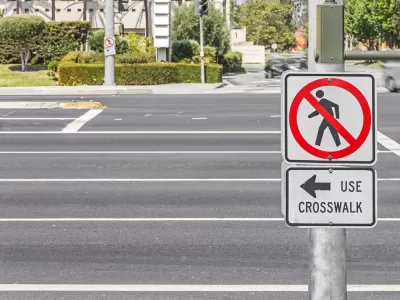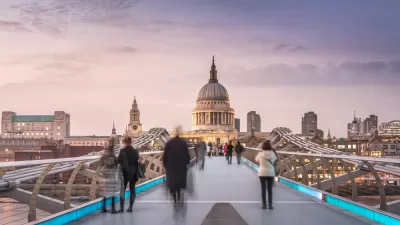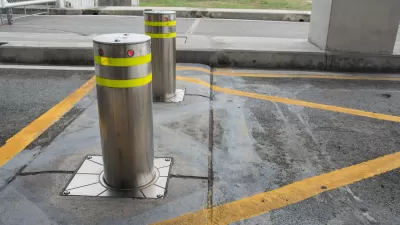Plenty of sidewalks stand in need of improvement, and many aren't there at all. But they're also a symbol of the automobile's engineered dominance of our roads.

According to Alissa Walker, the multi-modal city of the future might lack sidewalks, and that's a good thing. "'Sidewalks' is actually a misnomer," Walker writes, "because before cars existed, all modes of transportation mixed freely in the street: streetcars, carriages, horses, pushcarts, and, most of all, people walking in every direction."
The rise of the automobile pushed pedestrians to the side, and modern roads often deny them a place to walk altogether. "American society has so normalized our inferior sidewalk system that we don't believe we deserve a place to walk."
Meanwhile, a supposed "walking revolution" hasn't materialized, despite Complete Streets redesigns and campaigns to promote walking. "In 2016, Americans drove more miles than they have in any other year in history."
Frustratingly, says Walker, pedestrian improvements are now often perceived as a sign of gentrification. "Yet clean, safe, unbroken sidewalks have become such a rarity in this country that designing an area where people can get around primarily by walking—the one mode of transportation that is available and accessible to everyone—is now seen as a harbinger of displacement."
Truly shared streets would open up space for new modes, and a return to old ones. And as boomers age out of driving, we may see rising momentum for real pedestrian improvements.
FULL STORY: The case against sidewalks

Planetizen Federal Action Tracker
A weekly monitor of how Trump’s orders and actions are impacting planners and planning in America.

USGS Water Science Centers Targeted for Closure
If their work is suspended, states could lose a valuable resource for monitoring, understanding, and managing water resources.

Congress Moves to End Reconnecting Communities and Related Grants
The House Transportation and Infrastructure Committee moved to rescind funding for the Neighborhood Equity and Access program, which funds highway removals, freeway caps, transit projects, pedestrian infrastructure, and more.

Expanding Access to Design Education at Honolulu Community College
Honolulu Community College’s Architecture, Engineering & Construction Technologies program highlights the role of community colleges in preparing nontraditional students for careers in architectural and construction technologies.

Integrating Human Rights Into Energy and Extractive Sector Transitions
Why just transition efforts must move beyond economic considerations by embedding human rights principles into business practices to ensure equitable, transparent, and accountable outcomes for affected communities and workers.

Blocked, Restored, Blocked Again — Housing Funds in Legal Limbo
Since Trump took office, the administration has blocked multiple affordable housing funding streams. Here's a look at which funds have been frozen, which have been reinstated, and which are in the courts.
Urban Design for Planners 1: Software Tools
This six-course series explores essential urban design concepts using open source software and equips planners with the tools they need to participate fully in the urban design process.
Planning for Universal Design
Learn the tools for implementing Universal Design in planning regulations.
City of Moorpark
City of Tustin
Tyler Technologies
City of Camden Redevelopment Agency
City of Astoria
Transportation Research & Education Center (TREC) at Portland State University
Regional Transportation Commission of Southern Nevada
Toledo-Lucas County Plan Commissions





























